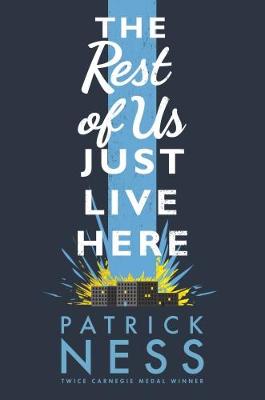Reviewed by nannah on
Book content warnings:
alcoholism
eating disorders
suicide ideation
The Rest of Us Just Live Here takes place in the middle of nowhere, in a place a lot like most small towns, with one restaurant, a high school, lots of trees, etc. But the "indie kids" there (or hipsters as I know them in my own little middle of nowhere) tend to be part of something bigger: what you'd think would be the plotline of the next big-trending fantasy. The main character, Mikey, is definitely not an indie kid, and that big ol' plotline is not for him. Instead, he and his friends are simply inhabitants of the same town those "main characters" live in. And, well, this is their story.
The result is some mixed realistic/coming-of-age and fantasy genre that ends up blending really well, surprisingly.
Patrick Ness really knows how to nail characterization - and show character in a few words. It took to about page 17 for me to fall head over heals for all the main 4 protagonists, and they're all so real it's terrifying. (I mean, maybe it's partly because they're diverse and actually have mental illnesses/struggles with body issues/etc. but I don't need to go into that further.)
The writing is even stronger when it comes to family dynamics. Even the supposedly "bad" parents are more layered and complicated than I thought at first. Right when I make up my mind about someone I'm finding my belief challenged.
I'm a little disappointed at the fatphobia (even if it was just a 1-sentence line - maybe my standards are set a little high for Patrick Ness). It could be the character, not the author, of course! But it's hard to know when that line (in the character's thoughts) aren't challenged at all.
Okay, so I lied when I said I was done talking about the importance of writing diverse characters. Because Mikey's personal story has helped me come to some realizations about myself.
Mikey has OCD and anxiety, and when the anxiety gets worse, so does the OCD. Okay, so there's some novels that have MC's with OCD, but the way Mikey's thoughts and patterns are written is all too relatable. I don't have OCD, but a bfrb (body-focused repetitive behavior), specifically dermatillomania (skin picking disorder). There are passages that I need to stop reading because I'm literally sobbing. The way Mikey can't stop doing something, even when it's causing him pain. It's all written in a way that it's hard not to relate to and feel validated if you struggle with something similar. Mikey eventually goes to therapy for his problem, and goes on meds. (The conversation with his therapist--the entire thing--is the realest thing I've ever read. The discussion about "if I go on medication, does that mean I've failed?", the talk about being messed up, etc.) So, yeah, I think I need help, too. I'll probably bring this book with me. Moral support, you know.
I was going to talk about something else, too, but that's a bit spoilery for the book and a bit personal for me. So nah, not today.
In the end, the book reached out and pretty much grabbed my heart. It would be difficult for me to give it anything but five stars. (I've also forced it onto friends, so . . . )
Reading updates
- Started reading
- 7 March, 2016: Finished reading
- 7 March, 2016: Reviewed
